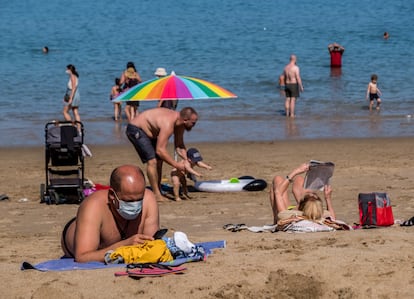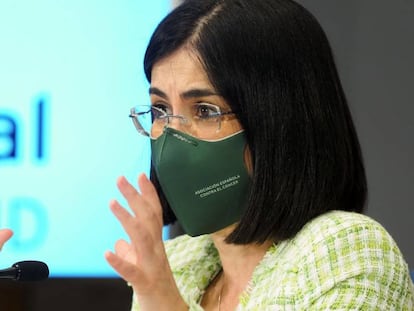Spain’s tourism industry rails against new face mask rules: ‘They are going to turn beaches into field hospitals’
Experts from the sector argue making coverings mandatory in all public spaces will hurt business and not do anything to stop coronavirus contagions
After a punishing year, the Spanish tourism sector is desperately in need of good news. But instead, the new law making face masks mandatory in all public spaces regardless of the distance between people has come as an additional blow. Until now, the law only imposed the use of masks if a safe distance of 1.5 meters could not be respected.
The change in the law went largely unnoticed until it was flagged up by EL PAÍS, despite its publication in the Official State Bulletin (BOE). The obligation to keep mouths and noses covered in public spaces, including the beach and swimming pool, will undoubtedly put a number of tourists off coming to Spain, according to industry pundits who point out that businesses were not consulted on the measure.
“We are going through the kind of hell that threatens to wipe out thousands and thousands of jobs and businesses,” says José Luis Zoreda, vice-president of Exceltur, the main lobby group for Spanish tourism – a sector which accounted for 12% of the country’s gross domestic product (GDP) prior to the health crisis. “And now they want to turn the beaches into open-air field hospitals.”

According to Zoreda, the sector has already given up any hope of an Easter rebound. “The crucial thing now is to look to the summer, which means instilling high levels of confidence so that foreigners or Spaniards want to visit,” he says.
Zoreda does not believe that these types of measures, which he considers “improvised,” are helpful in building that confidence. And it’s not just the face masks. In Exceltur, they are extremely critical of the ubiquitous images of illegal parties in tourist apartments in cities like Madrid and the new rules that require travelers coming over the French border to have a negative PCR test. “We ask that tourism be a state policy,” says Zoreda. “And we want more consistency between the measures, many of which seem contradictory.”
After talking to EL PAÍS by phone, Zoreda produces a meme showing the faces of two tourists who have a tan mark on their faces from wearing a face mask. The caption reads: “Souvenir of our vacation in Tenerife.” It is a joke, but one that aptly reflects the concerns of the sector.
The response in Valencia, Andalusia and Balearic Islands
Exceltur is not the only organization to criticize the Spanish government’s new face mask law. In regions highly dependent on tourism, the announcement has also come as a shock.
The Benidorm Hotel Association (Hosbec), considers the initiative “excessive.” According to Nuria Montes, the secretary general of Hosbec, “the security measures that were taken last year of creating plots on beaches, maintaining distances and monitoring compliance with the regulations proved to be effective. If you are with people from the same household in areas of 4x4 meters and maintain social distance, we do not understand why it would be necessary to wear a mask when sunbathing.”
But in the Valencia region, the use of face masks was already mandatory in public areas, including beaches and swimming pools, regardless of social distance. This law was passed in February and will remain in force until April 12. Only those in the water are exempt.
The government of the Balearic Islands, a popular tourist destination, announced on Wednesday that masks will not be mandatory at beaches and swimming pools in its territory, claiming that the new national law does not override its own regional legislation. According to health chief Patricia Gómez, “there is a sentence in the national law that mentions ‘in conformity with the health authorities.’ Our legal services feel that our legislation is not superseded by the national one, and our own measures will remain in force.”
We are going through the kind of hell that threatens to wipe out thousands and thousands of jobs and businessesJosé Luis Zoreda, vice-president of tourism lobby Exceltur
Last year, when the mandatory use of the mask was introduced to the Balearic Islands, the Balearic Hotel Chains Association reported cancellations and a drop in bookings from the United Kingdom and Germany, the main source countries of tourism to Spain.
In Andalusia, Juan Zapata, president of the Federation of Hotels and Tourist Accommodation (Fahat), says the new rules are “tolerable,” explaining that face masks had to be worn last year on beaches in the southern region. According to Zapata, the measure was “well-accepted” by tourists, given the seriousness of the health crisis.
“What really worries us hoteliers is the vaccination rollout and the restrictions on mobility because without mobility there is no tourism,” says Zapata, whose data reveals that 80% of the 500,000 hotel beds in the region are closed and just a fraction of the remaining 20% is occupied.
Meanwhile, the president of the Málaga Beach Bar Association, Manuel Villafaina, believes that the restrictions make patrons feel uncomfortable, especially in open-air spaces where social distancing can be respected. “It is logical to wear a mask when walking, but if you are in a hammock two meters away from everyone, it is not,” says Villafaina, whose association represents 1,100 entrepreneurs with beach bars, known as chiringuitos in Spain, hammocks and nautical areas. “It makes some people uncomfortable and they prefer to stay at home.”
However, Ivan Periano, president of the Cádiz Chiringuito Association, believes that the beaches will fill up this summer “with or without” the face mask rule and that a keen awareness of the pandemic must be maintained. “It has been a very complicated year for us,” he says. “With the restrictions on opening times and capacity, many of the beach bars have decided not to open because they could not make ends meet. This year we still don’t know what will happen. Decisions are taken every 15 days, depending on how the situation evolves.”
English version by Heather Galloway.
Tu suscripción se está usando en otro dispositivo
¿Quieres añadir otro usuario a tu suscripción?
Si continúas leyendo en este dispositivo, no se podrá leer en el otro.
FlechaTu suscripción se está usando en otro dispositivo y solo puedes acceder a EL PAÍS desde un dispositivo a la vez.
Si quieres compartir tu cuenta, cambia tu suscripción a la modalidad Premium, así podrás añadir otro usuario. Cada uno accederá con su propia cuenta de email, lo que os permitirá personalizar vuestra experiencia en EL PAÍS.
En el caso de no saber quién está usando tu cuenta, te recomendamos cambiar tu contraseña aquí.
Si decides continuar compartiendo tu cuenta, este mensaje se mostrará en tu dispositivo y en el de la otra persona que está usando tu cuenta de forma indefinida, afectando a tu experiencia de lectura. Puedes consultar aquí los términos y condiciones de la suscripción digital.










































